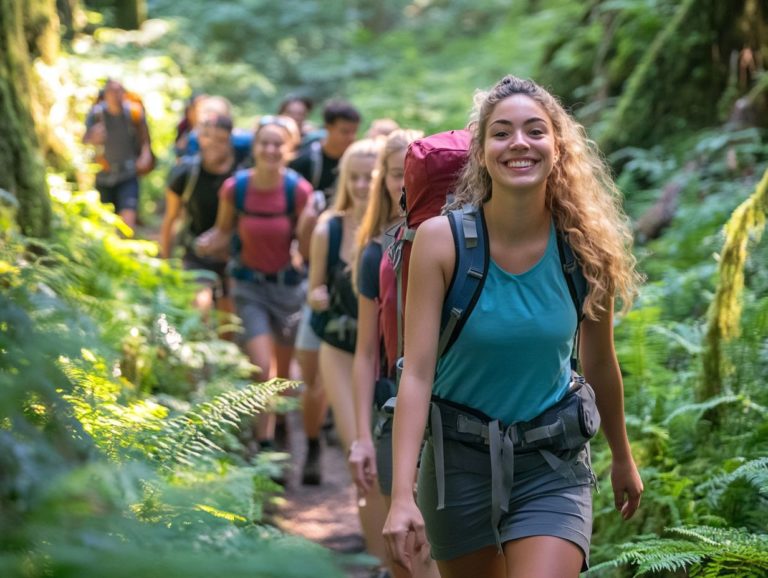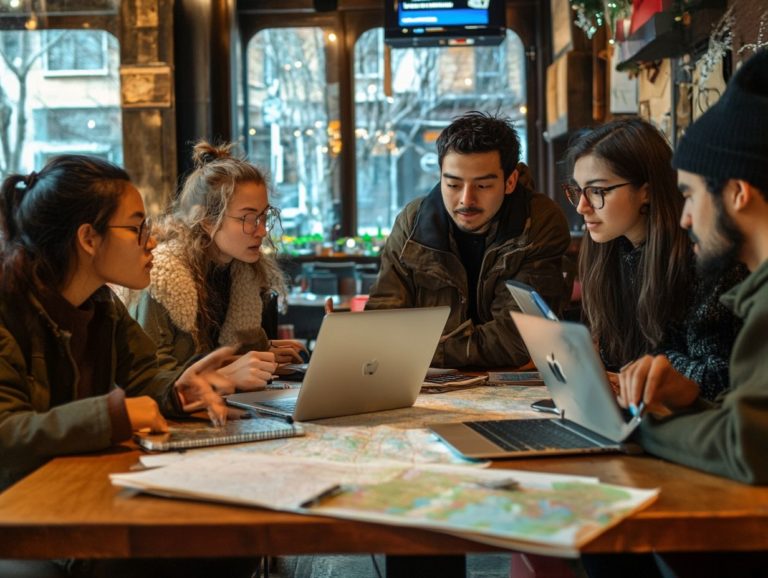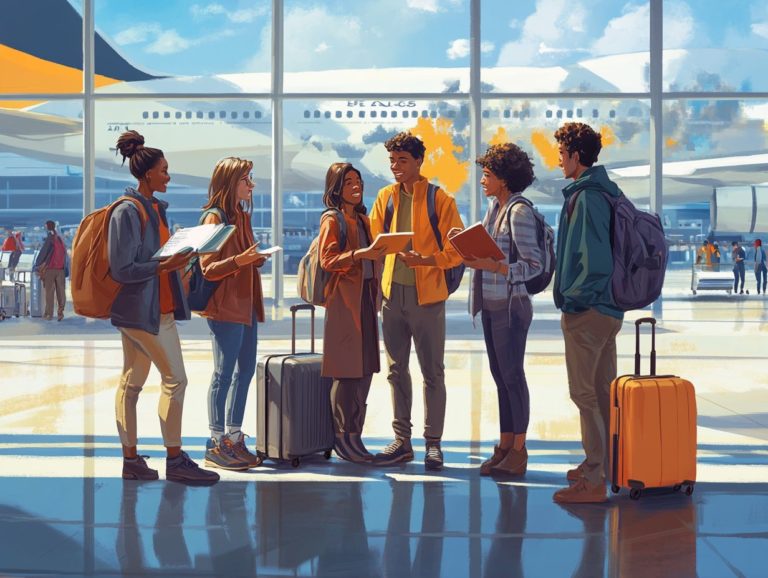5 Health and Safety Tips for Student Travelers
Traveling as a student can be an exhilarating adventure, filled with opportunities to explore new cultures, meet diverse individuals, and create unforgettable memories.
However, it also presents its own set of health and safety challenges. To ensure your journey is both enjoyable and secure, here are five essential tips to help you navigate potential pitfalls while traveling.
From thorough research and strategic packing to maintaining awareness of your surroundings, this guide will empower you with the knowledge to travel smart and stay safe.
Get ready to embark on your next big adventure!
Contents
- Key Takeaways:
- 1. Research Your Destination
- 2. Get Travel Insurance
- 3. Keep Important Documents Safe
- 4. Stay Aware of Your Surroundings
- 5. Take Care of Your Health
- What Are the Most Common Health and Safety Concerns for Student Travelers?
- Essential Emergency Preparedness Tips for Students Traveling
- What Are the Best Ways to Stay Safe While Exploring a New Place?
- What Are the Essential Items to Pack for a Safe and Healthy Trip?
- How Can Students Stay Safe and Healthy While Traveling on a Budget?
- What Should Students Do If They Encounter a Health or Safety Issue While Traveling?
- Frequently Asked Questions
- What Are the Top Five Health and Safety Tips for Student Travelers?
- Why Is It Important for Student Travelers to Research Their Destination?
- Are You Vaccinated? Essential Shots for Student Travelers!
- How Can Student Travelers Ensure Basic Hygiene Practices While on Their Trip?
- What Should Student Travelers Do to Stay Safe While Exploring Their Destination?
- How Can Student Travelers Stay in Touch with Loved Ones While Abroad?
Key Takeaways:
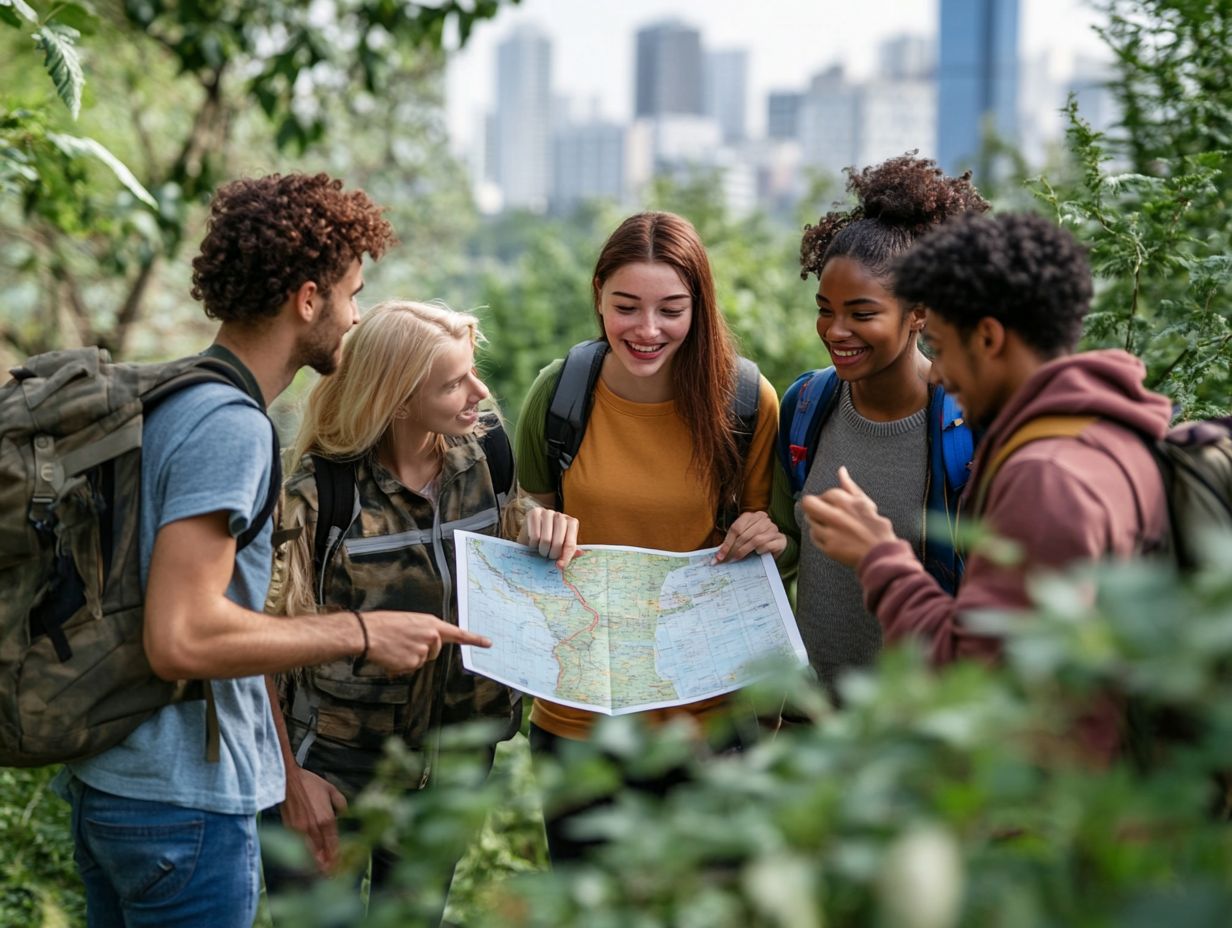
- Research your destination thoroughly to stay safe.
- Invest in travel insurance for unexpected emergencies.
- Keep important documents safe and accessible at all times.
1. Research Your Destination
Researching your destination is an essential first step for any traveler, especially for students. It equips you with vital knowledge about local customs, culture, and safety practices that can significantly enhance both your travel experience and personal safety.
By understanding local phrases and cultural norms, you not only blend in but also foster respect and goodwill with the locals, making your journey more enjoyable and secure.
Being aware of common scams can help you sidestep pitfalls that might otherwise lead to unpleasant experiences. A simple inquiry about basic emergency services in the area, such as hospitals or police stations, can provide invaluable peace of mind.
This awareness ensures you navigate unfamiliar environments with confidence, allowing for a richer, more immersive experience. Such depth comes only when you approach your adventure with a genuine commitment to understanding the unique tapestry of your destination.
2. Get Travel Insurance
Acquiring travel insurance is essential for you as a traveler, especially if you’re a student. It acts as a safety net, ensuring you have access to medical care, financial security, and peace of mind while navigating unfamiliar environments.
With various travel insurance options available, it s important to understand which ones will best meet your needs. Coverage for medical emergencies is crucial, as accidents or unexpected illnesses can strike at any moment. Protection against theft is also important, as it can save you from significant financial setbacks.
Trip cancellation coverage is another vital aspect, providing reimbursement when plans unexpectedly change. When selecting a policy, prioritize complete coverage, clarity in the contract, and a reputable insurer. Taking the time to understand the fine print will help you avoid common scams, ensuring your adventures remain enjoyable and stress-free.
3. Keep Important Documents Safe
Keeping your important documents safe while traveling is crucial, especially for students. Losing items like passports, identification, or insurance papers can lead to complications and safety risks that you want to avoid.
To mitigate these risks, consider implementing a few practical strategies:
- Use travel locks on your bags to add extra security, making it more challenging for anyone to access your belongings without your knowledge.
- Create digital copies of essential documents. Just scan or photograph them and store them securely in cloud storage.
- Designate a secure location, such as a hotel safe or a secure pocket in your backpack, for important items when they re not in use.
- Have emergency alerts ready, like knowing the local emergency services number, ensuring that if theft occurs, you can act swiftly to minimize further issues.
Take these tips to heart, and make your travel experience unforgettable!
4. Stay Aware of Your Surroundings
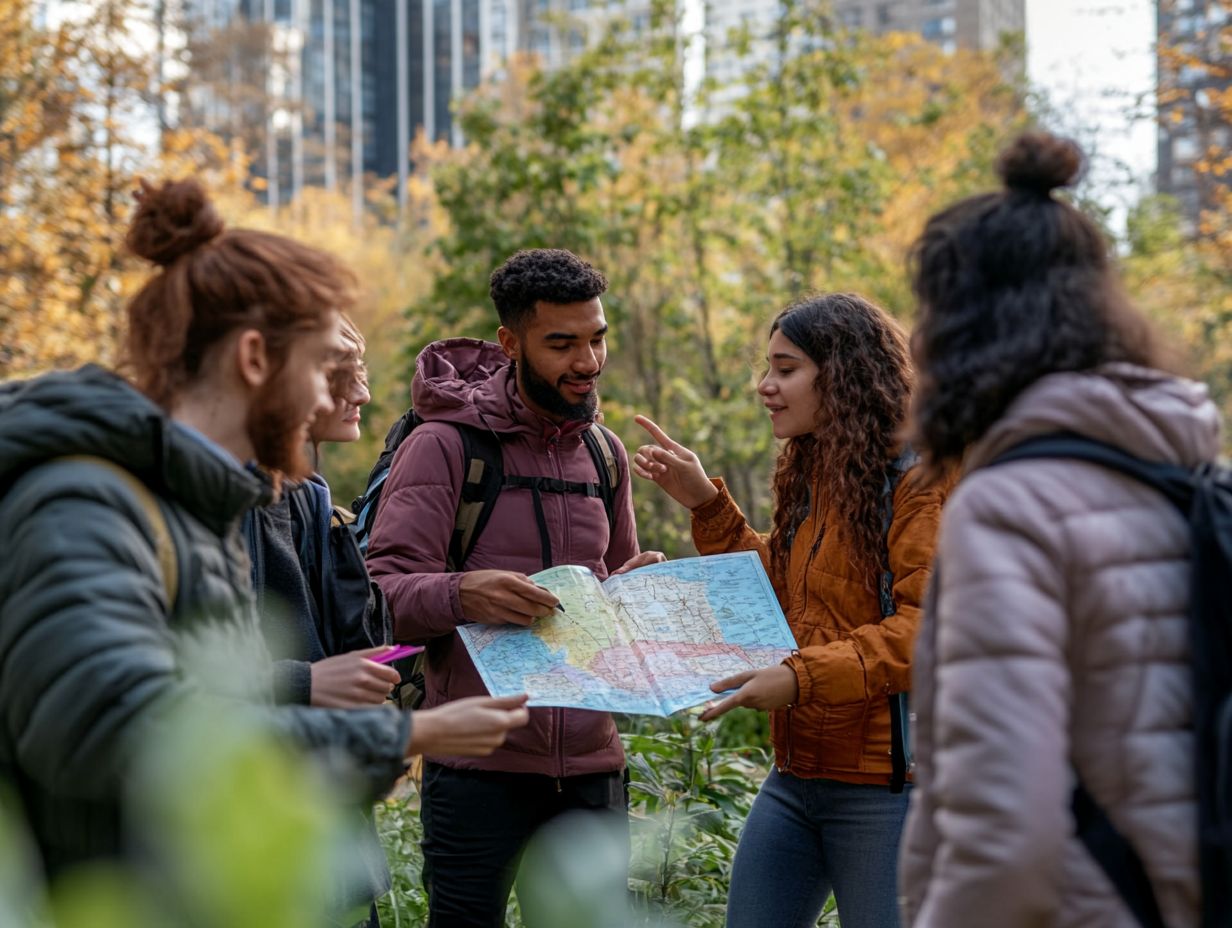
Staying aware of your surroundings is essential for personal safety, especially for travelers like you. This vigilance allows you to recognize potential scams and approach interactions with strangers cautiously as you explore new destinations.
To enhance your awareness, consider adopting a low-profile approach. Choosing understated clothing and skipping flashy jewelry can help you avoid attracting unwanted attention. Observing local behaviors will offer valuable insights into what s deemed acceptable and what might raise eyebrows.
Relying on reputable transportation options like licensed cabs (taxis that are officially registered and regulated) or well-reviewed rideshare services can significantly mitigate risks.
Engaging with locals for recommendations not only helps you pinpoint safe areas to explore but also fosters genuine connections, enriching your travel experience while keeping personal safety at the forefront.
5. Take Care of Your Health
Taking care of your health while traveling is essential for ensuring a safe and enjoyable experience, especially when you’re a student facing unique health risks in unfamiliar environments. To enhance your safety, consider these 5 safety tips for students traveling abroad.
Be proactive! Carry necessary medications and first-aid supplies to stay prepared for anything. Don’t overlook the importance of healthcare options nearby know what s available in case of emergencies.
Hydration is key; drinking plenty of water will help you maintain your energy levels and overall well-being. Be mindful of your food choices, too. Opt for balanced meals to avoid any digestive issues that could throw a wrench in your travel plans.
Recognizing potential health risks tied to the destination’s climate and local customs is crucial. By prioritizing these health precautions, you can focus on creating unforgettable memories instead of dealing with avoidable setbacks.
What Are the Most Common Health and Safety Concerns for Student Travelers?
Student travelers often face specific health and safety concerns that can significantly influence their travel experience, including matters related to financial safety, common scams, and access to necessary healthcare services. It’s essential to consider safety gear items for student travelers to enhance their protection while abroad.
Illness or injury can disrupt your itinerary and lead to unexpected expenses, making it essential to budget for potential health-related emergencies. Mental well-being is important; the pressures of travel combined with academic responsibilities can heighten anxiety and stress.
Understanding how to navigate healthcare systems abroad and securing comprehensive health insurance can provide you with peace of mind during your journey. Be alert to scams that might prey on your unfamiliarity with the local culture or language, underscoring the importance of education on recognizing fraudulent offers.
By planning ahead and conducting thorough research, you can effectively mitigate these risks and savor a more enriching travel experience.
Essential Emergency Preparedness Tips for Students Traveling
Preparing for emergencies while traveling is essential for you as a student, allowing you to respond effectively to unexpected situations, everything from health issues to theft, while ensuring your safety and well-being. Familiarizing yourself with essential travel tips for first-time students abroad can greatly enhance your preparedness.
Act now! Knowing local emergency service numbers can save your life in critical moments. Setting up emergency alerts on your smartphone keeps you in the loop about potential threats or natural disasters nearby.
It’s also wise to establish a clear plan for accessing medical care, whether through local health facilities or trusted contacts. Becoming familiar with local customs and basic language phrases can enable you to communicate more effectively during challenges, making it easier to navigate emergencies and seek help when needed.
What Are the Best Ways to Stay Safe While Exploring a New Place?
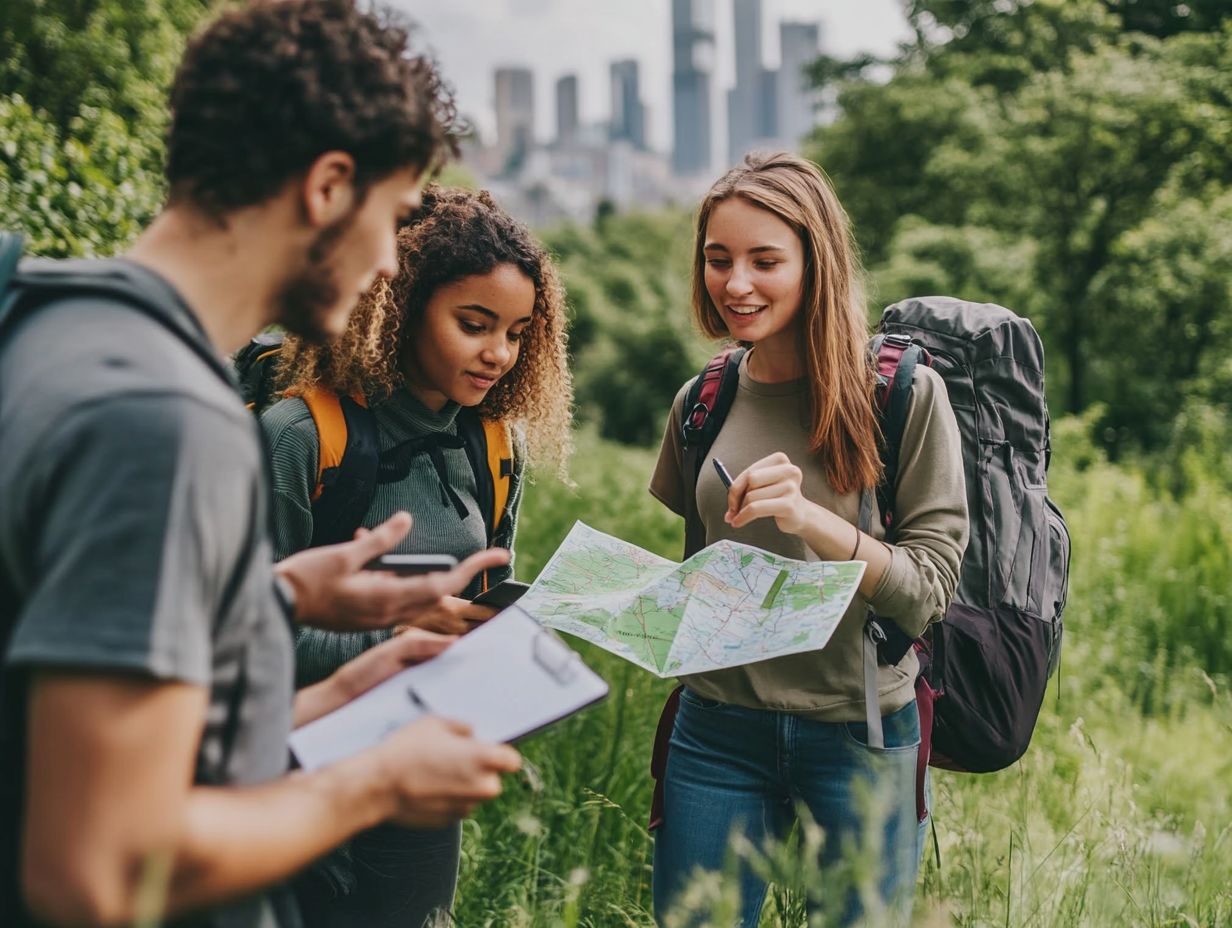
Exploring a new place can be an exhilarating experience for you as a student. To enhance your journey, consider following tips for traveling solo as a student to ensure your safety during this adventure, which calls for a blend of common sense, trust in your instincts, and a commitment to practical safety practices.
As you embark on this journey, remember the importance of staying in groups. Not only does it keep you safe, but it also makes your adventure more fun! Avoid isolated or unfamiliar areas, as they can harbor unforeseen dangers. Blending in with the locals will help you navigate your surroundings more comfortably, minimizing the chances of drawing unwanted attention.
When it comes to transportation, choosing well-reviewed and reputable services is crucial for a safer journey. Exercising caution in your interactions with strangers can turn potentially risky encounters into friendly ones, allowing you to fully enjoy your adventures with peace of mind.
What Are the Essential Items to Pack for a Safe and Healthy Trip?
Packing the right essential items is crucial for students like you to ensure a safe and healthy trip. To further enhance your travel experience, it’s important to learn how to avoid common travel mistakes as a student, which helps mitigate risks and prepares you for various situations you might encounter while traveling.
Keep a comprehensive first-aid kit on hand for minor injuries. Use locks for your bags to prevent theft. It s also wise to stash some emergency funds in a separate spot for unexpected expenses. Keeping digital copies of important documents can truly be a lifesaver if something gets lost or stolen.
Practicing smart money management throughout your trip allows you to avoid overspending on essentials. This ensures you can enjoy your experience without the burden of financial stress.
How Can Students Stay Safe and Healthy While Traveling on a Budget?
Navigating the journey of staying safe and healthy while traveling on a budget can be quite the challenge for you as a student. By implementing strategies from this guide on staying safe as a student abroad, it’s absolutely achievable without sacrificing your safety.
A little planning goes a long way in ensuring a worry-free experience. Don’t overlook travel insurance; it can save you from financial headaches when unexpected issues arise. For students, coping with travel anxiety is essential, so prioritize health precautions; get those vaccinations and carry basic first-aid supplies to keep yourself in good shape on the road.
When it comes to lodging, look for affordable yet secure accommodations. Hostels and guesthouses can offer both comfort and safety, helping you stay on track with your financial plans. Plus, opting for local eateries not only enhances your cultural experience but usually comes at a fraction of the cost compared to tourist traps. It s a win-win that supports the local community while delighting your taste buds.
What Should Students Do If They Encounter a Health or Safety Issue While Traveling?
When you encounter health or safety issues while traveling, knowing the right steps to take can profoundly impact how effectively you resolve the situation and maintain your personal safety. For insights on how to stay healthy while traveling abroad, it’s important to be prepared.
Your first course of action should always be to contact local emergency services immediately. They are equipped to provide the necessary professional assistance swiftly. Before you embark on your journey, it s wise to familiarize yourself with nearby medical facilities and emergency contacts specific to your destination.
Keeping friends or family informed can offer invaluable support. They might be able to provide advice or help coordinate care from afar. Sharing details about your whereabouts and the nature of the emergency enhances your safety and ensures that assistance can be dispatched promptly.
Frequently Asked Questions
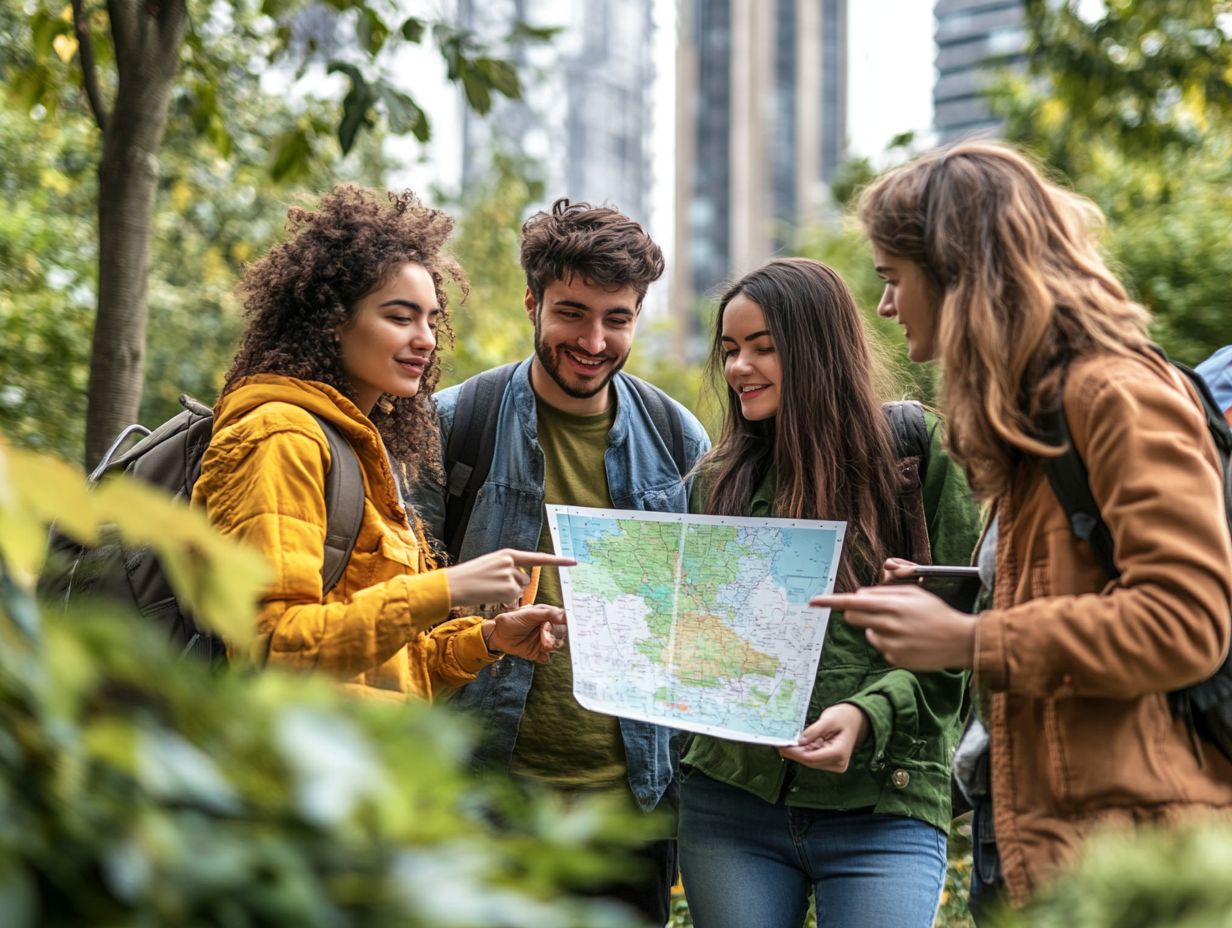
What Are the Top Five Health and Safety Tips for Student Travelers?
The top five health and safety tips are:
- Always research your destination and its potential health issues beforehand.
- Get necessary vaccinations shots that help prevent diseases and carry a first aid kit.
- Follow basic hygiene practices, like washing your hands frequently.
- Be aware of your surroundings; trust your instincts!
- Stay in touch with family and friends. Share your travel plans with them.
Why Is It Important for Student Travelers to Research Their Destination?
Researching your destination helps you understand potential health issues, such as certain diseases, natural disasters, or political instability. This knowledge allows you to take precautions and plan your trip safely.
Are You Vaccinated? Essential Shots for Student Travelers!
Student travelers should get any vaccinations recommended by the Centers for Disease Control and Prevention (CDC) for their destination. This may include shots for measles, hepatitis A and B, typhoid, and yellow fever. For a more adventurous experience, consider traveling off the beaten path and consult with a healthcare professional to find out which vaccinations you need before your trip.
How Can Student Travelers Ensure Basic Hygiene Practices While on Their Trip?
To maintain hygiene while traveling, pack hand sanitizer and use it often, especially before eating or after using the restroom. Carry disinfectant wipes to clean surfaces like airplane tray tables or hotel room doorknobs. Also, remember to drink only bottled or purified water!
What Should Student Travelers Do to Stay Safe While Exploring Their Destination?
Stay aware of your surroundings and trust your instincts while exploring. Stick to well-lit and busy areas and avoid walking alone at night. Keep valuable items secure and don’t display large amounts of cash. If something feels off, remove yourself from the situation immediately.
How Can Student Travelers Stay in Touch with Loved Ones While Abroad?
Provide your loved ones with a detailed itinerary and keep in touch regularly through phone calls, texts, or social media. Designate an emergency contact who can be reached if needed. This way, both you and your loved ones can have peace of mind during your travels!

